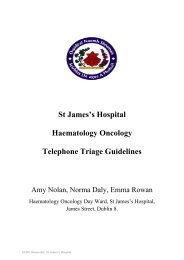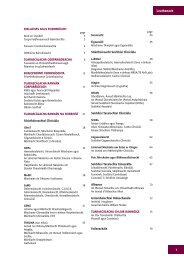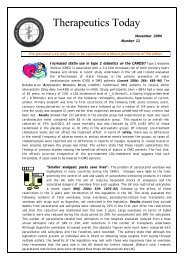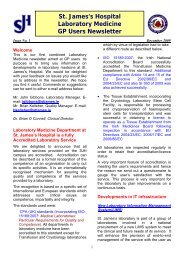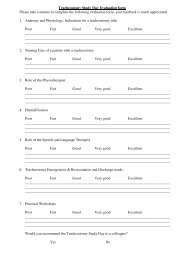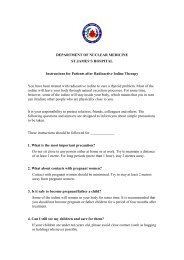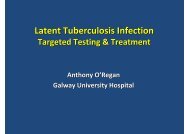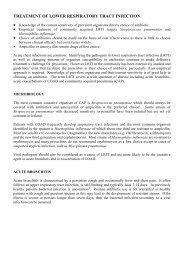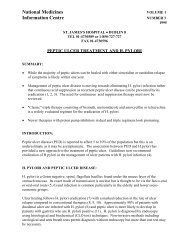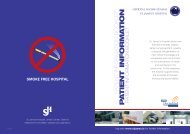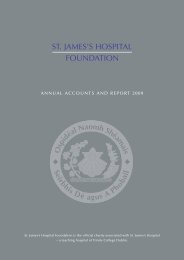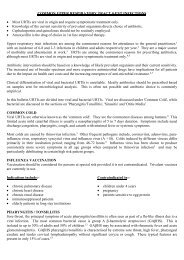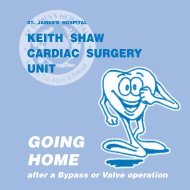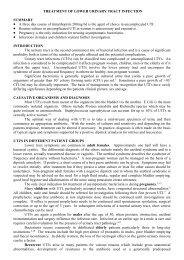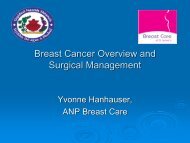Vol.5 No.4 Drug Treatment of Alzheimer's Disease
Vol.5 No.4 Drug Treatment of Alzheimer's Disease
Vol.5 No.4 Drug Treatment of Alzheimer's Disease
You also want an ePaper? Increase the reach of your titles
YUMPU automatically turns print PDFs into web optimized ePapers that Google loves.
DRUG TREATMENT OF ALZHEIMER’S DISEASE<br />
SUMMARY<br />
+ Alzheimer’s disease (AD) is the most common dementing disorder in the<br />
elderly with age<br />
being one <strong>of</strong> the greatest risk factors.<br />
+ Early and accurate diagnosis is important for the management <strong>of</strong> AD.<br />
Specialist<br />
assessment is recommended before drug treatment is initiated. Ongoing<br />
evaluation<br />
<strong>of</strong> response to treatment is essential.<br />
+ Donepezil and rivastigmine have been shown to have modest<br />
improvements on<br />
cognitive function and activities <strong>of</strong> daily living. However, little evidence<br />
<strong>of</strong> improvement<br />
on the quality <strong>of</strong> life <strong>of</strong> patients or their carers has been shown.<br />
Alzheimer’s disease (AD) is a progressive neurodegenerative disorder with<br />
characteristic clinical and pathological features. 1 It is now recognised as the most<br />
common dementing disorder in the elderly. 2 Age is one <strong>of</strong> the greatest risk factors for<br />
developing AD with nearly 50% <strong>of</strong> those over 85 years affected. 1,2,3 AD affects<br />
approximately 33,000 Irish people. 4 Epidemiological studies have shown a higher<br />
incidence <strong>of</strong> AD in women, the risk being 1.2-3.5 times greater than in men. 5 Other<br />
risk factors include family history, presence <strong>of</strong> apolipoprotein E4 allele and mutations<br />
<strong>of</strong> chromosomes 1, 14 and 21. 1,2,5 Management <strong>of</strong> these patients presents a<br />
multidisciplinary challenge. Possible, but not proven, protective factors against AD<br />
include the use <strong>of</strong> oestrogen replacement therapy, use <strong>of</strong> NSAIDs, education and<br />
challenging occupations. 6 Recently two agents have been licensed in Ireland for the<br />
treatment <strong>of</strong> this condition namely donepezil and rivastigmine.<br />
Aetiology<br />
The aetiology <strong>of</strong> AD remains elusive although considerable progress has been made<br />
in understanding its biochemical and genetic mechanisms. 7 The histopathologic<br />
hallmarks <strong>of</strong> AD are the presence <strong>of</strong> senile plaques and neur<strong>of</strong>ibrillary tangles. 8 These<br />
plaques and tangles interrupt normal neuronal transmission and are associated with<br />
cell death. Multiple neuronal pathways are destroyed leading to neurotransmitter<br />
deficits e.g. cholinergic, serotonergic, adrenergic. 9 Although other neurochemical<br />
abnormalities have been described, the most striking and consistent changes <strong>of</strong> AD<br />
are in the cholinergic system, the so-called “cholinergic hypothesis”. 2,10 Genetic<br />
factors also thought to be involved include the discovery that the gene for<br />
apolipoprotein E4 allele is found three times more frequently in people with AD than<br />
in age-matched control subjects. 7<br />
Clinical Presentation<br />
AD results in cortical atrophy which particularly affects the temporal lobes and<br />
hippocampus. The clinical presentation <strong>of</strong> the disease reflects the distribution <strong>of</strong>
pathology in these brain areas and consequently problems with higher cortical<br />
function are prominent. The clinical hallmark <strong>of</strong> dementia associated with AD is the<br />
gradual onset and progression <strong>of</strong> short-term memory loss and other cognitive<br />
functions. 8 These deficits develop so insidiously that it is <strong>of</strong>ten years before patients<br />
or their families seek medical attention. Almost invariably the first symptom is shortterm<br />
memory loss e.g forgetting appointments. As the AD progresses, the patient<br />
typically has difficulty performing routine tasks at home or work. Ultimately the<br />
patient becomes less able to perform basic activities <strong>of</strong> daily living and self care<br />
functions e.g. dressing. 11,12 Agitation, anxiety, restlessness, depression, day-night<br />
disorientation, delusions, hallucinations and other behavioural disturbances frequently<br />
complicate the middle stages <strong>of</strong> AD. 11,12 In the final stages the patient may be unable<br />
to recognise family members and unable to communicate. 5,12<br />
Diagnosis<br />
The clinical diagnosis <strong>of</strong> AD relies heavily on obtaining a good history from a reliable<br />
informant. Definitive diagnosis <strong>of</strong> AD requires histological demonstration <strong>of</strong> the<br />
characteristic plaques and tangles, this is rarely done as it requires autopsy or brain<br />
biopsy material. 2 The characteristic onset and course <strong>of</strong> memory and other cognitive<br />
deficits make AD a diagnosis <strong>of</strong> inclusion. 8 Tests routinely performed include a<br />
cognitive assessment using qualitative tests e.g. Mini-Mental State Examination<br />
(MMSE - Table 1), general physical and neurological examinations, lab procedures,<br />
thyroid function, serum biochemistries. 12 These tests, combined with CT scan <strong>of</strong> the<br />
brain, MRI, and a cerebral single photon emission computed tomography (SPECT)<br />
scan can be 90-95% accurate. 13 It is preferable that the decision to commence patients<br />
on therapy should be supported by a specialist review.<br />
Table 1: Mini-Mental State Examination (MMSE)<br />
Severity Of AD<br />
Scale Values (0-30 points)<br />
Mild AD 21-30<br />
Moderate AD 11-20<br />
Severe AD 0-10<br />
<strong>Treatment</strong><br />
<strong>Treatment</strong> <strong>of</strong> AD is aimed at improving cognition, preventing further cognitive<br />
decline and reducing disruptive behaviour associated with the condition. 5 An accurate<br />
diagnosis is required. A period <strong>of</strong> observation <strong>of</strong> 3-6 months may be required to<br />
confirm the progression <strong>of</strong> cognitive loss and assess its functional impact. 1 The<br />
“cholinergic hypothesis” suggests that potentiation <strong>of</strong> central cholinergic function<br />
should improve the cognitive, and perhaps even the behavioural manifestations, <strong>of</strong><br />
AD. 10 Most <strong>of</strong> the research and development into the treatment <strong>of</strong> AD has been based<br />
on this hypothesis. For AD treatments currently approved, evidence <strong>of</strong> efficacy is<br />
limited to studies in mild to moderate AD. The Alzheimer’s <strong>Disease</strong> Assessment<br />
Scale (ADAS- cog), the Clinician’s Interview Based Assessment <strong>of</strong> Change Plus<br />
(CIBIC-Plus) and Clinical Global Impression <strong>of</strong> Change (CGIC) are the parameters
used to assess efficacy <strong>of</strong> drug treatment. A thorough and repeated evaluation <strong>of</strong><br />
response to treatment is essential and monitoring <strong>of</strong> compliance and response to<br />
treatment should include input from a carer. Criteria for early stopping <strong>of</strong> therapy<br />
would include poor tolerance and compliance, deterioration at the pre-treatment rate<br />
after 3-6 months <strong>of</strong> therapy and an accelerating deterioration. 14 Symptomatic and<br />
palliative treatment <strong>of</strong> the disease is important. This should include management <strong>of</strong><br />
depression, agitation and hallucinations.<br />
Donepezil (Aricept®)<br />
Donepezil is a piperidine-based acetylcholinesterase (AChE) inhibitor with dose<br />
dependent activity. It displays selectivity for AChE, the predominant cholinesterase<br />
in the brain. Donepezil has a long duration <strong>of</strong> cholinesterase inhibition allowing once<br />
daily administration. 15 It is licensed for the symptomatic treatment <strong>of</strong> dementia in<br />
mild to moderately severe AD. 16 The initial recommended dose <strong>of</strong> donepezil is 5mg<br />
once a day which should be taken in the evening or prior to retiring. In order to allow<br />
the earliest clinical response to the therapy to be assessed this dose should be<br />
maintained for at least one month. After this time the dose may be increased to 10mg<br />
once a day. 16<br />
Donepezil is generally well tolerated with most side-effects being mild, transient and<br />
occurring early in the course <strong>of</strong> treatment. Dose dependent side-effects include<br />
nausea, diarrhoea, muscle cramps, fatigue, insomnia. 9,17,18,19 No clinically significant<br />
effects have been reported on clinical laboratory tests or hepatic function. 20 More<br />
recently there have been reports <strong>of</strong> psychiatric disturbances including hallucinations,<br />
agitation and aggressive behaviour. These effects tend to resolve on reducing the<br />
dose or discontinuing the drug. 21 Displacement studies have shown that donepezil has<br />
no effect on the binding <strong>of</strong> frusemide, digoxin or warfarin. Pharmacokinetic studies<br />
have shown that donepezil does not alter the clearance <strong>of</strong> theophylline, warfarin or<br />
digoxin. 16,18,20 <strong>Drug</strong>s that are known to be inhibitors or inducers <strong>of</strong> CYP3A4 or 2D6<br />
may inhibit or increase the rate <strong>of</strong> metabolism <strong>of</strong> donepezil e.g. erythromycin,<br />
fluoxetine, phenytoin. 18<br />
When donepezil was launched, only one published study was available, namely a 12<br />
week double blind trial that assessed 5mg once a day versus placebo. A significant<br />
improvement was shown in ADAS-cog. However, twelve weeks is too short a period<br />
<strong>of</strong> time to highlight cognitive decline and no change was observed in the CGIC. 17,22<br />
More recent studies in 473 and 468 patients assessed over 24 weeks and 12 weeks<br />
respectively, randomised to receive 5mg or 10mg once a day found that donepezil<br />
produced improvement in global performance, as indicated by the CIBIC-Plus.<br />
However, most <strong>of</strong> these improvements were modest. When donepezil was<br />
discontinued, a greater deterioration was noted in all measures for the treated groups<br />
than would be expected in untreated, but otherwise similar patients with AD.<br />
Donepezil does improve rating scales <strong>of</strong> cognitive function in mild to moderate AD.<br />
These improvements though are small and must be balanced against the unproven<br />
effects on quality <strong>of</strong> life and day to day functioning. It is also not possible to predict<br />
in whom the possible benefits may occur. 17,23,24<br />
Rivastigmine (Exelon®)
Rivastigmine is a novel “pseudoirreversible” selective inhibitor <strong>of</strong><br />
acetylcholinesterase in the brain. 25 The pseudoirreversible mechanism <strong>of</strong> action<br />
results in prolonged inhibition <strong>of</strong> AChE after the drug has been cleared from the<br />
plasma. 26,27 <strong>Treatment</strong> with rivastigmine therapy should be initiated and supervised by<br />
a physician experienced in the diagnosis and treatment <strong>of</strong> AD. Therapy should only<br />
be started if a carer is available who will regularly monitor drug intake by the patient.<br />
An initial dose <strong>of</strong> 1.5mg twice a day is recommended. If this is well tolerated, the<br />
dose may be increased to a maintenance dose <strong>of</strong> 3-6mg twice a day. Patients should<br />
be maintained on the highest tolerated dose; the maximum recommended dose is 6mg<br />
twice a day. 28<br />
Studies have shown adverse effects to be generally mild and to occur most frequently<br />
during the dose escalation phase. The effects most commonly reported are<br />
cholinergic effects, nausea, vomiting, diarrhoea, abdominal pain and anorexia. Apart<br />
from nausea, no significant difference in the incidence <strong>of</strong> adverse effects between a<br />
dose <strong>of</strong> 1-4mg daily and placebo have been noted. 25 Gastrointestinal effects have been<br />
reported to occur more commonly in women. Cholinesterase inhibitors may cause<br />
weight loss and patients with AD tend to lose weight. Close monitoring <strong>of</strong> the<br />
patient’s weight should be undertaken. 28 In comparison to donepezil, CYP450 is not<br />
involved in the metabolism <strong>of</strong> rivastigmine therefore reducing its propensity to<br />
interact with drugs metabolised by specific CYP450 isoenzymes. 27,29 No<br />
pharmacokinetic interactions have been observed between rivastigmine and digoxin,<br />
warfarin, diazepam or fluoxetine, in studies in healthy volunteers. Rivastigmine may<br />
exaggerate the effects <strong>of</strong> succinylcholine type muscle relaxants during anaesthesia. 28<br />
Most information available on the safety and efficacy <strong>of</strong> rivastigmine is known from a<br />
large trial involving over 3000 patients known as the ADENA trial. This multicentre<br />
study compared the effects <strong>of</strong> low-dose rivastigmine (1-4mg/d), high-dose<br />
rivastigmine (6-12mg/d) and placebo over a 26 week period. Stabilisation <strong>of</strong><br />
cognitive decline and improvements in activities <strong>of</strong> daily living (by 10%) were found<br />
to occur at the high dose compared to placebo. 25<br />
Other <strong>Treatment</strong>s<br />
Relieving the behavioural complications associated with AD is an important goal. 10<br />
Depression, agitation, hallucinations and insomnia can <strong>of</strong>ten complicate the<br />
management <strong>of</strong> this condition. Depression can be treated successfully with<br />
antidepressant agents. Agitation is <strong>of</strong>ten difficult to treat. Several agents have been<br />
tried such as benzodiazepines and neuroleptics. Hallucinations / delusions may be<br />
managed using an antipsychotic agent with a low potential for inducing<br />
extrapyramidal side-effects. Insomnia may be managed by the use <strong>of</strong> hypnotic<br />
agents. 2<br />
Future Developments<br />
The management <strong>of</strong> AD has been an area <strong>of</strong> great therapeutic development in recent<br />
years. In addition to drugs acting on the cholinergic system e.g. metrifonate, other<br />
future developments include the use <strong>of</strong> neuroprotective agents e.g. alpha-tocopherol. 6<br />
In summary, the emergence <strong>of</strong> treatments for this condition is a welcome<br />
development. However, modest improvements have been shown and these must be
weighed against the cost <strong>of</strong> such treatments, the inability to decide which patients are<br />
likely to benefit and little proven effect on the quality <strong>of</strong> life <strong>of</strong> patients and carers.<br />
Early and accurate assessment and diagnosis are the key to management, along with<br />
ongoing evaluation <strong>of</strong> response to therapy. 13<br />
Cost <strong>of</strong> 28 Days Therapy (GMS May 99)<br />
Preparation<br />
Cost<br />
Donepezil (Aricept®) 5mg OD £74.88<br />
Rivastigmine (Exelon®) 3mg BD £69.18<br />
REFERENCES<br />
1. Can Med Assoc J 1997;157:1047-52 16. Prod Info Aricept®<br />
2. Pharmacotherapy 1991;11:237-241 17. DTB 1997;35:75-6<br />
3. Am J Med 1998;104:32s-38s 18. J Clin Pharm Ther 1997;22:251-255<br />
4. Correspondance AD Assocn <strong>of</strong> 19. Med Lett <strong>Drug</strong>s Ther 1997;39:53-4<br />
Ireland<br />
5. J Am Pharm Assoc 1997;NS37:347- 20. Am J Health-Syst Pharm<br />
52<br />
1997;54:2805-10<br />
6. Neurology 1998;51:s2-s17 21. DTB 1998;36:60-1<br />
7. Am Fam Phys 1998;57:1577-1590 22. Dementia 1996;7:293-303<br />
8. Am J Med 1997;103:3s-10s 23. Neurology 1998;50:136-145<br />
9. Ann P’cotherapy 1998;32:70-7 24. Arch Intern Med 1998;158:1021-<br />
1031<br />
10. Postgrad Med 1997;101:73-90 25. BMJ 1999;318:633-40<br />
11. JAMA 1997;278:1363-1371 26. J <strong>Drug</strong> Dev Clin Pract 1996;8:9-14<br />
12. Geriatrics 1997;52:s22-s25<br />
27. Clin Ther 1998;20:634-647<br />
13. Aust Pharm 1999;18:296-303 28. Prod Info Exelon®<br />
14. Lancet 1997;350:232-3 29. J <strong>Drug</strong> Dev Clin Pract 1996;8:1-8<br />
15. J Clin Psych 1998;59:s8-s13



